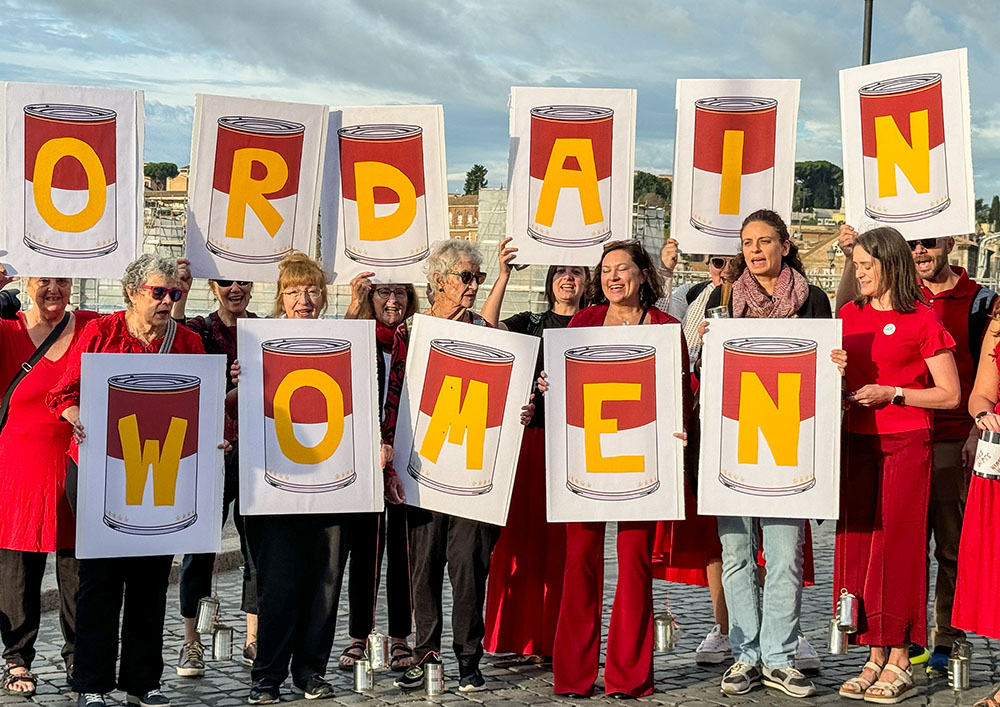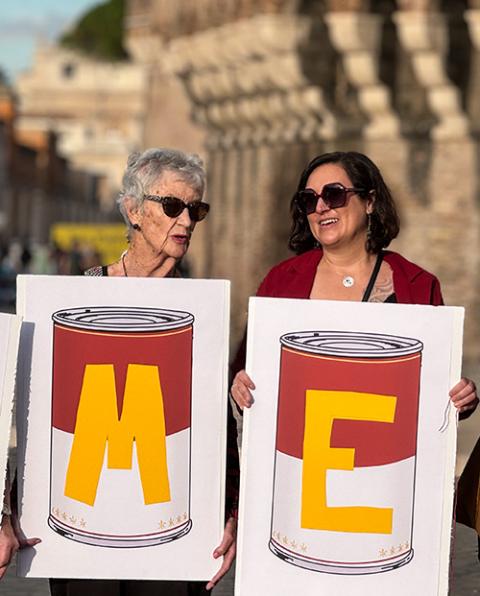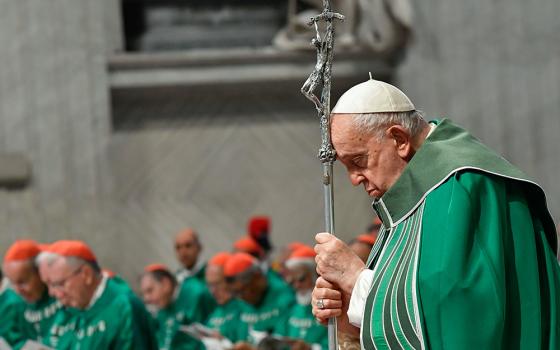
Members of the Women’s Ordination Conference, Women’s Ordination Worldwide, Roman Catholic Womenpriests-USA gather near the Vatican to pray for the Catholic Church to open up the priesthood to women as the worldwide consultation known as the synod begins Oct. 2. (GSR photo/Rhina Guidos)
Regardless of what happens this month at the Vatican when it comes to women's ministries, Catholic women in Latin America will continue serving the poor and also want to maintain dialogue on the issue, said a U.S.-based theologian who hails from Latin America.
"The pastoral necessities are real and my sisters ... are not going to leave them because the female diaconate is not recognized," said Dominican Sr. Mila Díaz Solano. The Peruvian theologian has taught at Mundelein Seminary in Illinois and conducts Bible courses in a formation program for permanent deacons and catechetical leaders at the Chicago Archdiocese.
While the diaconate for women is not on the agenda for the final phase of the synod on synodality, a four-year-long worldwide consultation that began in 2021, those like Díaz say it is an issue that will continue even after the synod ends Oct. 27. During a Sept. 1 gathering of sisters from Latin America serving missions in the U.S., Díaz said that practical realities in remote areas such as parts of the Amazon — where there are no priests serving permanently — will continue to push the issue to the forefront.
Groups such as the Ecclesial Conference of the Amazon (CEAMA for its Spanish acronym) and Amerindia, a grassroots network of Catholic groups from Latin America and the Caribbean, see the issue as essential enough to the presence of the church that they have planned events in Rome during the Oct. 2-17 synod to bring attention to the topic.
U.S.-based groups, too, are out in full force in Rome, but with a focus on the long-denied equality of women in the church, pushing beyond the diaconate and for recognized priesthood, saying that women, too, feel a calling to the ministry and it should not be denied.

Two women hold up letters that help spell "Ordain Women" near the Vatican after praying for the Catholic Church to open up the priesthood to women Oct. 2. (GSR photo/Rhina Guidos)
On the eve of the synod's 2024 opening, the Women's Ordination Conference, Women's Ordination Worldwide, and Roman Catholic Womenpriests-USA gathered, along with others, Oct. 1 at Rome's Basilica of St. Praxedes for a prayer vigil.
The Rev. Angela Nevitt Meyer, of Roman Catholic Womenpriests, said her organization's presence at the vigil during the synod is meant as "a powerful testimony to our belief in the renewal and transformation of the church, centered on the equality and inclusion of all."
As the synod opened Oct. 2, she joined others a short distance from St. Peter's Basilica to pray and to voice her convictions, telling the Vatican "don't kick the can" down the road on women's ordination.
Synod organizers have said the role of women as deacons or priests will not be part of discussions. But Meyer said she held hope for a future where equality and justice, in the form of allowing women to participate in holy orders, are fully realized in the church.
"We hope that our prayerful presence will be received not as dissent but as a manifestation of the Holy Spirit, who seeks to unify the church while also celebrating its rich diversity," she said.
Many in the U.S., like the Women's Ordination Conference, expressed "great disappointment" with Pope Francis when he told CBS Evening News anchor Norah O'Donnell in an interview aired in May that he wasn't open to the idea of women deacons "with holy orders," even as he recognized that many function as such and have "always" done so.
His answer reverberated in places such as Holy Trinity Catholic Church in Washington, where Jesuit Fr. William Kelley said in an Aug. 31 homily that the pontiff's response "stunned many of us," admitting that his remark "caused many of us to waver in our hope."
Kelley invoked in his prayers help from heaven via Mercy Sr. Theresa Kane, who died in August. In 1979, she told Pope John Paul II during his visit to the U.S., "The church in its struggle to be faithful to its call for reverence and dignity for all persons must respond by providing the possibility of women as persons being included in all ministries of our church."
Kane's memory and her fight for a church that is more inclusive of women are a constant presence among U.S. groups advocating for their ministry in Rome this month.
Advertisement
Díaz said Latin American groups' approach is one that takes the long view on the issue.
"It's not that it doesn't matter to Latin America, but the work has to continue," she said.
If the Vatican approved the diaconate for women, the only thing that would be different is the recognition of that work, she said.
"They are preaching in parishes where there are no priests. They take part in sacramental and liturgical life, and in the administration of parishes in areas that are very far away. ... So, the proposal of the diaconate is more than anything else a recognition of the work that is already being done," she said. "Now, at a worldwide level, it is a process that has to be a long one."
And that's something many in Latin America are willing to accept, she said.
"I know that [religious] communities in Latin America are not upset with the pope," over his comments, she said.
There are questions that need pondering, a theological view, as well as the practical considerations about pastoral needs, she said.
"Is it out of pastoral necessity, out of service or recognition? Does the proposal arise out of a pastoral need or the need for female participation in spaces of power?" she said. "If this is to better serve the people, and if it's to be a seed for the kingdom, well, then we have to work together."
She said she encouraged others to "enter into dialogue with sisters from the south," meaning Latin America. Some groups such as Discerning Deacons already are doing that, including participating in events in Rome in conjunction with CEAMA.
"Instead of protesting, we want to enter into dialogue in the spaces where decisions are made, and create alliances with priests, with bishops, working together, because it is necessary," she said. "Because if not, then it becomes about a competition with the clergy and we want to be able to work together as church."
To those like Kelley, however, it is less about competition than about putting obstacles that have gotten in the way of women answering a call that God has put in them, just as God called him to the priesthood.
"Our church has squandered so much energy, talent and grace in our refusal to welcome equal partnership with women in ministry and leadership," he said in his homily. "Are we content to forever endure this injustice which leaves so many Catholic women, and the men who respect them, and more calamitously, drives from our Catholic community, innumerable others who refuse to tolerate such discrimination any longer?"








